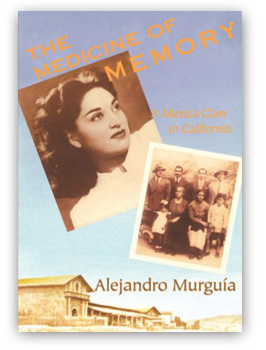
ORDER: Amazon | IndieBound
“People who live in California deny the past,” asserts Alejandro Murguía. In a state where “what matters is keeping up with the current trends, fads, or latest computer gizmo,” no one has “the time, energy, or desire to reflect on what happened last week, much less what happened ten years ago, or a hundred.” From this oblivion of memory, he continues, comes a false sense of history, a deluded belief that the way things are now is the way they have always been.
In this work of creative nonfiction, Murguía draws on memories—his own and his family’s reaching back to the eighteenth century—to (re)construct the forgotten Chicano-indigenous history of California. He tells the story through significant moments in California history, including the birth of the mestizo in Mexico, destruction of Indian lifeways under the mission system, violence toward Mexicanos during the Gold Rush,
Chicano farm life in the early twentieth century, the Chicano Movement of the 1960s, Chicano-Latino activism in San Francisco in the 1970s, and the current rebirth of Chicano-Indio culture. Rejecting the notion that history is always written by the victors, and refusing to be one of the vanquished, he declares, “This is my California history, my memories, richly subjective and atavistic.”
Reviews
A native Californian, American Book Award winner Murguia (ethnic studies, San Francisco State Univ.; Southern Front) traces his own family’s history, as well as the long story of Hispanics in America, back to the 18th century. He grew up mostly in the Los Angeles area, lived in Mexico, and took part in the Chicano movement of the 1960s, finally moving to San Francisco in the 1970s. In this “creative nonfiction,” he shares some wild stories of his family and his youth, giving us a zesty taste of Latino life. Not claiming to be a historian, he offers his personal take on significant events in the history of Chicano-Indio culture in California, such as the lynching of a Mexican woman during the California Gold Rush, the missions and their effect on Indian culture, and the activist 1970s in San Francisco. Murguia’s spirited writing makes the past and his family come alive for the reader. Recommended for all libraries with collections in Hispanic culture, especially those in California.
—Library Journal
With new conceptions and interpretations, this book is a significant contribution in a number of fields: California history, México and the Southwest, pre-colonial California, Chicano studies. It is also an example of the finest of memoir literature…. Murguía is an elegant stylist reminiscent of Hemingway in his deceptive simplicity.
—Roxanne Dunbar-Ortiz, Professor of Ethnic Studies, California State University, Hayward
